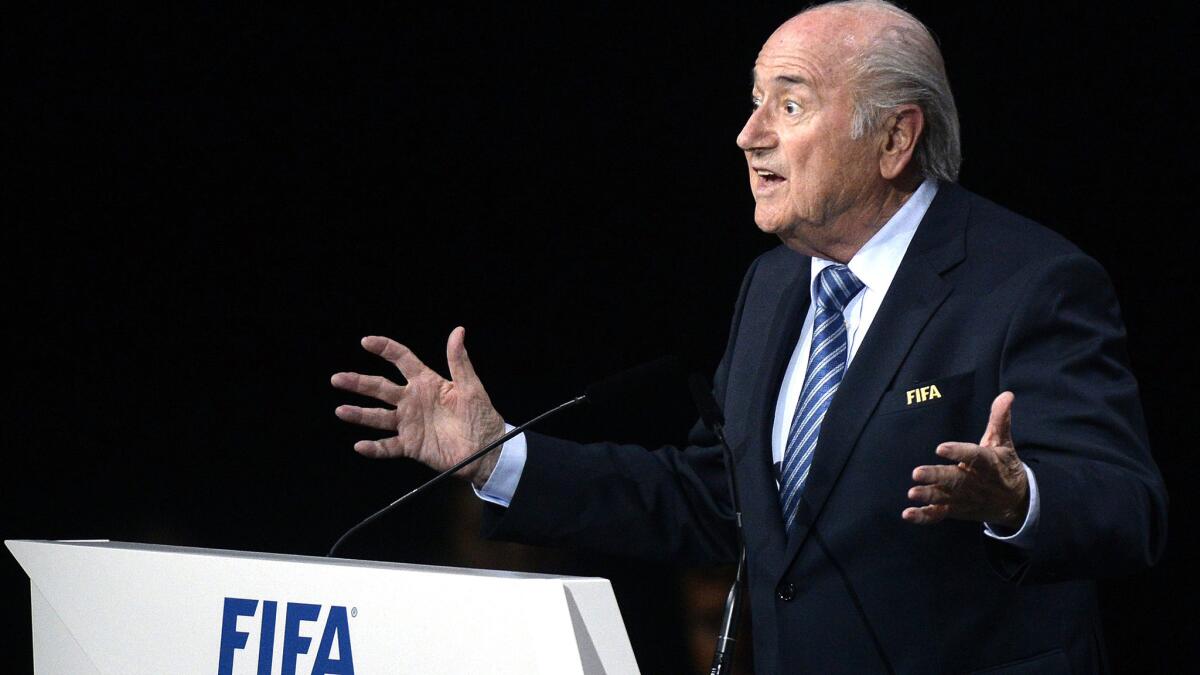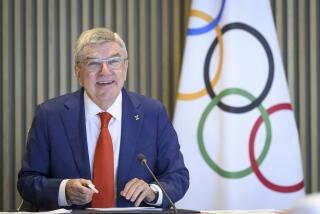Commentary: Sepp Blatter’s inability to reform FIFA to doom him despite reelection

President
- Share via
Now that Sepp Blatter has been elected to a fifth term as FIFA president, the focus shifts to “What’s next?”
And the tea leaves aren’t aligning favorably for world soccer’s beleaguered leader.
Corporate sponsors, who helped FIFA accumulate revenue of more than $5.7 billion over the last four years, are threatening to take their money elsewhere unless there is reform in an organization rocked this week by a 47-count federal indictment alleging racketeering, fraud and money laundering, among other charges.
And the investigations are continuing, both in the U.S. and in FIFA’s Swiss home, where officials say they are looking into criminal mismanagement and money laundering surrounding the votes that gave the 2018 and 2022 World Cups to Russia and Qatar, respectively.
Last year, the Sunday Times of London printed a damning expose about the 2010 balloting process for the next two World Cups, which was followed by a 350-page report compiled at FIFA’s behest by Michael Garcia, a former U.S. attorney for the Southern District of New York.
FIFA and its supporters dismissed the newspaper reports, then quashed the Garcia investigation, leading Garcia to resign as chairman of the investigatory chamber of FIFA’s ethics committee.
But Blatter and his cronies will have a much tougher time ignoring criminal charges. And though FIFA has said it will not revisit the decision of where to play the next two World Cups, that too could change if Swiss authorities can prove a conspiracy in the voting.
Russian President Vladimir Putin quickly got in front of the process, going on TV to accuse the U.S. of meddling in FIFA’s affairs in an attempt to take the World Cup away from Russia.
As a result, even an airtight case of corruption regarding the vote for the 2018 Cup could make the soccer community reluctant to challenge Russia, which has spent billions preparing for a tournament now just three years away.
The case of Qatar is different. Though enormously wealthy, the tiny Middle Eastern monarchy doesn’t wield anything near the political power of Russia. And with the tournament seven years distant, FIFA has plenty of time to find an alternative site.
Preparations to stage a World Cup in Qatar have already proved an embarrassment. Amnesty International, the United Nations and other organizations have found that immigrants brought to Qatar for World Cup construction projects are frequently treated like slaves while forced to endure dangerous working conditions in summer heat that frequently tops 100 degrees.
That heat also forced FIFA to move the tournament from June and July to November and December for the first time in its history, causing massive scheduling problems for virtually every top-flight professional league in the world.
The U.S., which finished second in the fraud-tainted 2010 vote, would seem the most likely location if the 2022 tournament is moved. The country has the infrastructure and the administrative know-how to stage the tournament, having already hosted the successful 1994 World Cup. The U.S. is also home to many of FIFA’s upset corporate partners — including Visa, McDonald’s, Coca-Cola and Nike — all of whom would benefit greatly from an American World Cup.
Logic has never been a strong suit of FIFA, though.
U.S. Soccer Federation President Sunil Gulati angered many FIFA officials by leading the support for the quixotic campaign of Blatter’s only opponent in Friday’s vote, Jordan’s Prince Ali bin al-Hussein. It was Galati who nominated Ali for president in February and Gulati was the first to embrace Ali after his concession speech.
But even after Friday’s electoral victory, Blatter appears weakened. It’s becoming increasingly clear that Blatter — after four decades with FIFA, the last 17 years as its president — has neither the ability nor the will to reform an organization apparently riddled by corruption. Blatter, who has been investigated but not indicted, still bears responsibility because he was in charge when many of the alleged crimes were committed.
So cleaning up world soccer can’t happen while he remains in charge, which is why calls for his resignation increased even as the votes were being counted Friday. Blatter won’t go quietly. In a pair of acceptance speeches, he moved to consolidate his base by thanking the tiny Asian and African federations that supported him, federations the U.S. and European soccer powers have long ignored but must now try to win over.
“Our goal is for governance of FIFA that is responsible, accountable, transparent and focused solely on the best interests of the game,” Gulati said a statement.
It’s a goal that seems far more attainable now than it did just a week ago.
Twitter: @kbaxter11







